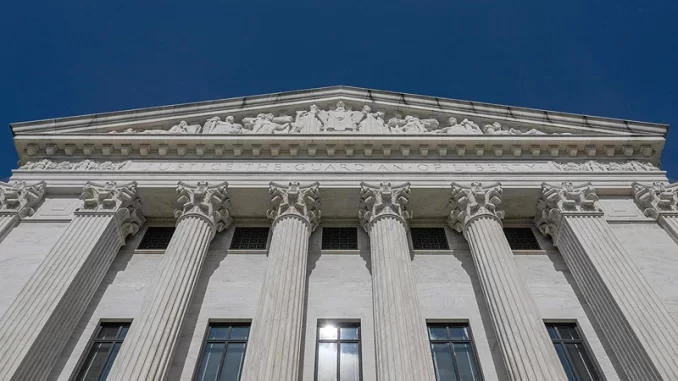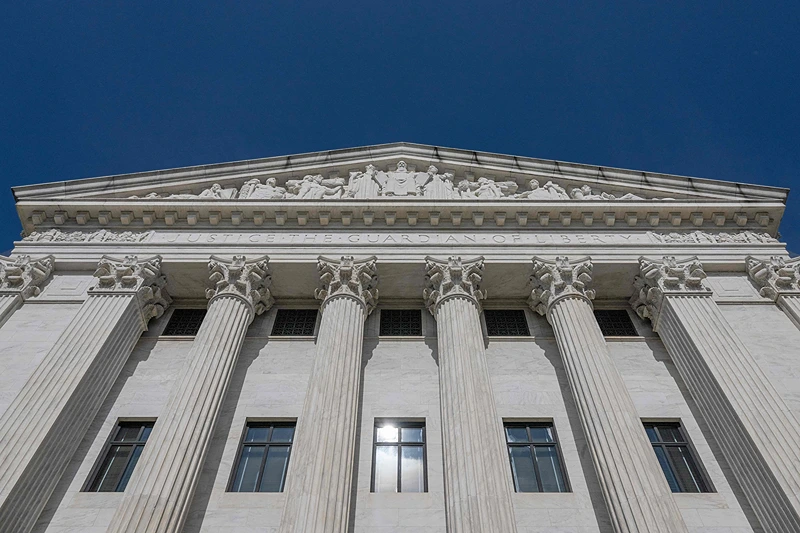

OAN’s Brooke Mallory
11:32 AM – Monday, June 27, 2023
The Supreme Court rejected a legal theory on Tuesday that argued state legislatures had the ability to alter election laws without scrutiny from state courts.
Advertisement
In a dispute involving North Carolina’s congressional map, the court rejected the “independent state legislature” notion by a 6-3 majority. The once-controversial legal theory maintained that state courts had little, if any, jurisdiction to examine state legislators under federal election rules.
The Moore v. Harper court decision slams the door on what could have been a major revision of America’s voting rules.
A particularly robust interpretation of the theory, which the court rejected, would have empowered state legislatures to make decisions on all aspects of elections, from congressional lines to how people register to vote and cast ballots, with no opportunity for challengers to dispute those decisions in state courts under state laws or constitutions.
Opponents of the idea contended that it may have resulted in unfettered party gerrymandering and regulations, making it more difficult for individuals to vote.
The court’s ruling was written by Chief Justice John Roberts, who was joined by three liberal justices, Sonia Sotomayor, Elena Kagan, and Ketanji Brown Jackson, as well as two other conservatives, Brett Kavanaugh and Amy Coney Barrett.
Justices Clarence Thomas, Samuel Alito, and Neil Gorsuch voted no.
The Supreme Court upheld state courts’ authority to evaluate election rules under state constitutions while urging federal courts to “not abandon their own duty to exercise judicial review.”
Conservative legal activists, supported by some GOP officials, had pushed the Supreme Court to expand the power of state legislatures, which have frequently been under Republican control in recent years. A Supreme Court decision adopting the theory would have upended legislative elections and perhaps the presidential election as 2024 approaches.
However, the Supreme Court determined that the United States Constitution authorizes state courts to continue to interpret state constitutions in order to limit legislators’ authority.
“The Elections Clause does not insulate state legislatures from the ordinary exercise of state judicial review,” Roberts wrote.
The majority opinion written by Roberts does not provide state courts unfettered reign to impose constraints on legislative action. The top justice issued a type of caution to state courts not to go too far, but the decision issued on Tuesday left open the question of when such a state court judgment would be excessive.
“The questions presented in this area are complex and context-specific,” Roberts wrote. “We hold only that state courts may not transgress the ordinary bounds of judicial review such that they arrogate to themselves the power vested in state legislatures to regulate federal elections.”
Despite that disclaimer, the ruling signals a significant loss for supporters of the autonomous state legislative theory, in part since Roberts won a six-justice majority for his argument, essentially sidelining three of the court’s more conservative justices on the matter.
Some court observers were surprised by the court’s decision to issue a definite judgment. The case began with Republican lawmakers disputing a verdict given by the North Carolina state Supreme Court, which concluded that legislatively drawn lines constituted unconstitutional political gerrymandering. For the 2020 elections, a court-drawn map was ultimately utilized.
In December, the United States Supreme Court heard arguments in the federal lawsuit. Following those arguments, however, the state Supreme Court said that it would rehear its own recently issued judgment, which came after the state court flipped from 4-3 Democrat justices to 5-2 Republican justices in the November elections. The state court eventually overturned its prior decision, stating that it would not rule on political gerrymandering. In 2019, the U.S. Supreme Court ruled that federal courts could not monitor political gerrymandering.
The state court’s extraordinary move to rehear and eventually overturn its own finding may have undermined the basis for the U.S. Supreme Court to hear the federal Moore case, however, several parties asked the justices to issue a ruling regardless.
Thomas contended in his dissenting opinion, which was supported in part by Alito and in whole by Gorsuch, that the issue was rendered moot by the North Carolina Supreme Court’s machinations.
“The issue on which it opines, a federal defense to claims already dismissed on other grounds, can no longer affect the judgment in this litigation in any way,” Thomas wrote. “As such, the question is indisputably moot.”
Thomas also said that Roberts’ decision was too broad and would be difficult to implement in federal court.
“In many cases, it is difficult to imagine what this inquiry could mean in theory, let alone in practice,” wrote the court’s senior justice.
The dissenters, however, did not propose a clear alternative criterion, nor did they proclaim that legislators should be completely exempt from state judicial review.
In a concurring opinion filed on Tuesday, Kavanaugh stated that he would have established a particular criterion to evaluate when state court orders exceeded their legal boundaries. He stated that he would have used a criterion outlined by then-Chief Justice William Rehnquist in the Bush v. Gore presidential election decision in 2000, permitting federal courts to overturn state court verdicts that “impermissibly distorted” state law “beyond what a fair reading required.”
At least four justices on the United States Supreme Court, the three dissenters and Kavanaugh, have previously expressed some interest in the autonomous state legislative theory in their writings. However, a majority of the court appeared hesitant to embrace a robust version of the idea during oral arguments.
All parties appeared to agree that, regardless of the case’s outcome, federal courts would retain the authority to examine state election law changes that violate federal law or the federal Constitution.
Stay informed! Receive breaking news blasts directly to your inbox for free. Subscribe here. https://www.oann.com/alerts

